“We have control of our online lives. We just have to remember it.”
Parent Zone founder and CEO Vicki Shotbolt explores the current mindset around digital and how Parent Zone aims to build confidence, agency and better futures for children.
![]()
There is a disconcerting amount of talk about the 1970s at the moment. Disconcerting because I remember the 70s the first time around and they were pretty rubbish.
Fashion was horrible. Central heating was pathetic. As a child, I thought power cuts were quite cool but I didn’t really need electricity after 6pm. Kids TV was limited to a couple of hours after school and turning off Crossroads was a blessing not a curse.
If that’s where we’re heading, I can only say the pandemic was more fun. And the pandemic wasn’t fun at all. Far better to look forward and try to navigate towards something that doesn't involve Bri-Nylon and storage heaters.
That’s what we try to do at Parent Zone.
Getting it right for children
Our constant refrain is: ‘how do we improve outcomes for children?’. Future outcomes. Enhancing life chances with and through the confident use of technology.
We sit at the heart of digital family life working with tech companies, governments, grant makers, professionals and (most of all) parents – to try to get it right for children.
We’re often described as ‘pragmatic’ and there is a reason for that. We’re pragmatic because life isn’t black and white. Technology isn’t all good or all bad. Public policy isn’t all right or all wrong. Families don’t succeed or fail. They just try.

Due to high demand you can now attend our Digital Families Conference 22 on the 18th of October virtually, as well as in-person. Register here for free
A more positive future
The majority of the discussions we join focus on the digital questions:
-
Are companies recklessly ignoring their own age ratings?
-
Are algorithms pushing dangerous content towards children?
-
Do commercial imperatives trump safety every time?
-
Is intimacy being damaged by technology?
We aim for a more positive future for children. The dystopian black mirror narrative doesn’t serve anyone terribly well, least of all parents who want the best for their families.
Building confidence is important
That’s one of many reasons for Parent Zone being part of the media literacy task force – established by the government to support one of the priorities arising from the Online Safety Bill.
We need to ensure that we are all learning how to understand and manage technology to suit our families. We are all using digital services, so it makes sense for us to know how to use them confidently.
But confidence is a funny thing. Tell someone they can’t do something often enough and they will start to believe you. Tell people that they have no control over a given situation and they start to live that reality.
The internet is not the ‘wild west’
A very famous researcher called Julian Rotter described the notion of ‘locus of control’. It is concerned with a person's generalised expectations about his or her ability to control reinforcements in life. Individuals who tend to perceive events as internally controlled behave more self-determinedly; those who tend to perceive events as beyond their control behave more fatalistically.
I think about that from time to time when I hear people say that the internet is like ‘the Wild West’. Or when, as recently happened, I find myself on a panel with an expert who said ‘the internet is killing our kids’.
This picture of a world so lawless and out of control hardly inspires confidence in a parent, when there is so much that can be done to maximise positive experiences and limit the risks.
Take Search. Turning on SafeSearch is one of the easiest things to do and it is turned on automatically for people Google believes to be under 18. It isn’t perfect – but you can’t protect children from hearing offensive things and that would never stop you riding the number 38.
Or time limits. Instagram has a ‘take a break’ feature that you can turn on through the activity tab. Interestingly, teenagers who turn this on keep it turned on, according to Meta. Which is a very nice message for any parent who thinks their child is addicted to technology.
How about your right to request your personal data? This is something anyone can do from a data processor (like Google or Meta or Twitter) – thanks to the General Data Protection Act.
The point is, we do have agency.
Listen to Parent Zone's podcast, Tech Shock.
We have choice and control
Information is power. Understanding digital spaces allows children and parents to make informed decisions and become confident users.
Our job is to remind families that they have agency – and help them to exercise it. To help parents maximise positive use so that children who can’t make it into school can still learn. Or parents who want to work from home so they can confidently use tech to develop a family-friendly career.
Looking back over the work we’ve done during the last two years, I hope we’ve helped families to feel more confident, reminded them that they can take control and make informed decisions and most of all, removed some of the guilt that we hear about so frequently from parents.
For example, when the Children’s Code – sometimes referred to as the age appropriate design code – was introduced in 2020 it set out some really important principles, including turning autoplay off for children. A dad recently admitted that he had turned autoplay back on for his children on a video streaming platform – because it gave him and his partner a precious 20 minutes to prepare dinner without having to keep pressing play.
It’s our job to remind parents.
If it helps...
If it’s done with sensible boundaries....
And if it works for your family and child…
It’s absolutely fine to turn autoplay back on – because that’s what having choice and control is all about.
Collaborating means we can create the best online world for young people: working with those who care about children’s futures and who have the power to change them. To find out more, download our Impact Report.
Latest Articles

The Tech Shock podcast – the 'wicked problem' of child financial harms
This week Vicki is joined by PUBLIC's Maya Daver-Massion and Zixuan Fu to unpack child financial harms.

The Tech Shock podcast – has media literacy’s time finally come?
Vicki and Geraldine are joined by Professor at Bournemouth University, Julian McDougall, to discuss all things media literacy.

The Tech Shock podcast – the emerging gender divide
Rosie Campbell, professor of politics and director of the Global Institute of Women's Leadership at King's College London, joins Vicki to discuss gender and online life.

